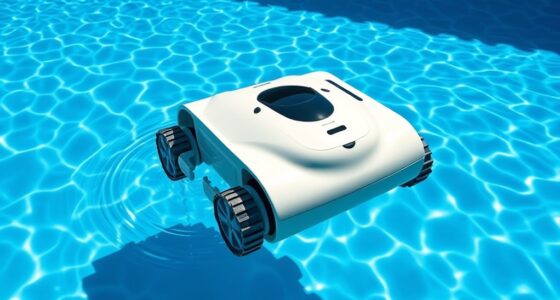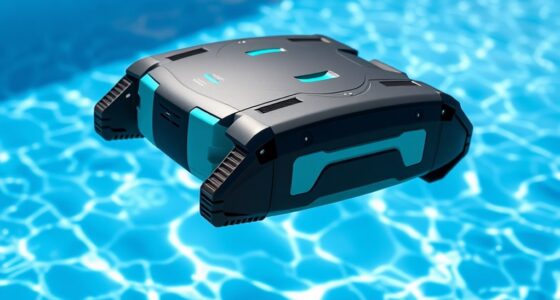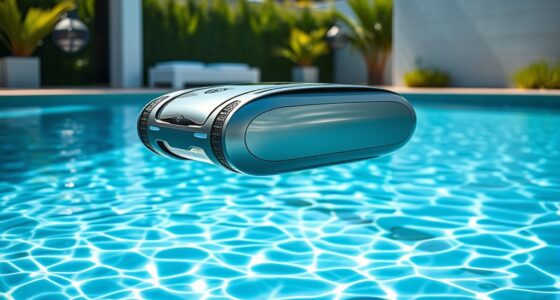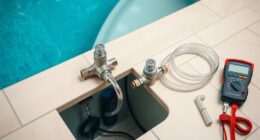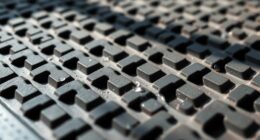To safely add swimming pool chemicals, it is important to prioritize safety gear such as gloves, goggles, and a mask to protect against direct contact, splashes, and harmful vapors. It is crucial to follow the manufacturer’s instructions for accurate dosing in order to maintain water balance and prevent hazards. Avoid mixing chemicals to prevent explosions and ensure proper ventilation and storage. Store chemicals in cool, dry places and label containers correctly to prevent any reactions. Ventilate mixing areas outdoors to reduce fume exposure. Keep chlorine levels between 1-4 ppm for effective sanitization. Regularly monitor and adjust pH levels for a comfortable swimming environment and surface protection. Stay tuned for more detailed steps on pool chemical care.
Key Takeaways
- Wear proper gear: gloves, goggles, mask to prevent contact and inhalation hazards.
- Read manufacturer's instructions: accurate dosage info for safe and effective chemical use.
- Avoid chemical mixing: prevents reactions, fires, and toxic gas release.
- Store chemicals correctly: cool, dry, labeled containers away from sunlight.
- Ensure ventilation: mix chemicals outdoors, use fans for fume control.
Importance of Proper Gear
To guarantee your safety when handling swimming pool chemicals, the importance of wearing proper gear can't be overstated. When working with pool water and chemicals, it's essential to protect yourself from potential harm.
Proper gear such as gloves, goggles, and a mask plays a critical role in ensuring your safety. Gloves act as a barrier, preventing direct contact with chemicals during handling and mixing, reducing the risk of skin irritation.
Goggles shield your eyes from splashes and fumes, safeguarding against irritation and potential damage. Additionally, a mask helps to avoid inhaling harmful chemical vapors, protecting your respiratory health.
Reading Manufacturer's Instructions

Why is it important to carefully read and adhere to the manufacturer's instructions when handling swimming pool chemicals?
The manufacturer's instructions are essential for understanding how to properly handle, mix, and add chemical products to your pool. These guidelines provide vital information on the accurate dosage and application methods for each specific chemical, ensuring that you're using them effectively and efficiently.
Incorrectly adding pool chemicals can result in water imbalance, equipment damage, and even safety hazards for you and your swimmers. By following the manufacturer's instructions diligently, you can maintain a safe swimming environment and prevent potential issues that may arise from improper chemical care.
Avoiding Chemical Mixing

When adding swimming pool chemicals, it's important to avoid chemical mixing to prevent dangerous reactions.
Mixing different chemicals can result in explosions, fires, or the release of toxic gases, posing serious risks to your safety.
Maintain proper ventilation in the mixing area, follow manufacturer guidelines, and store chemicals separately to uphold a safe pool maintenance routine.
Chemical Incompatibility Risks
Mixing certain pool chemicals poses significant risks of creating dangerous reactions that can result in toxic gas release or explosions. Common chemical combinations to avoid include chlorine and acid, chlorine and ammonia, and chlorine and shock treatments. These mixtures can lead to skin and respiratory irritation, property damage, and serious injuries.
Always read product labels and follow manufacturer recommendations to prevent hazardous chemical interactions. Consult a professional or refer to a chemical compatibility chart to guarantee safe handling and storage of pool chemicals. It's essential to understand that the consequences of mixing incompatible chemicals can be severe.
Proper Chemical Storage
To guarantee the safe handling and storage of pool chemicals, proper chemical storage practices are essential. Store chemicals in a cool, dry place away from direct sunlight to prevent degradation.
It's important to keep different chemicals in separate, labeled containers to avoid accidental mixing, which could lead to hazardous reactions. Avoid storing pool chemicals near flammable substances or in high humidity areas to prevent any potential risks.
Never mix chlorine with acid products, as this can release toxic gases and pose serious health hazards.
After each use, be sure to properly seal chemical containers to prevent leaks or spills, maintaining a safe storage environment.
Mixing Area Ventilation
Proper ventilation is essential for ensuring your safety when handling pool chemicals to avoid inhaling harmful fumes. Adequate ventilation in the mixing area is vital to prevent respiratory issues caused by chemical fumes. Mixing pool chemicals in a well-ventilated outdoor area helps dissipate chemical odors, reducing the risk to your health. Avoid mixing chemicals in enclosed spaces or areas with poor airflow, as this can lead to harmful fume inhalation. Utilizing ventilation fans or opening windows can greatly improve air circulation while mixing pool chemicals, further minimizing exposure to dangerous chemical fumes.
| Ventilation Tips | Importance of Proper Ventilation |
|---|---|
| Mix chemicals outdoors | Prevent inhaling harmful fumes |
| Avoid enclosed spaces | Reduce risk of respiratory issues |
| Use ventilation fans | Improve air circulation |
Slow and Incremental Additions

For safer handling and more precise control, consider adding swimming pool chemicals gradually and in small amounts. Slowly introducing pool chemicals into your water helps prevent sudden imbalances in the pool chemistry, ensuring a more stable environment for swimmers.
Incremental additions allow you to have better control over the chemical levels, reducing the risk of over-treating the pool or causing adverse reactions. By adding chemicals slowly, you can also monitor the effects of each chemical on the water quality more effectively. This method enables you to fine-tune the balance of your pool water, making adjustments as needed without drastic changes.
Ensuring Dissolution and Dispersion

Guarantee efficient distribution of pool chemicals by prioritizing proper dissolution and dispersion methods. To ensure the effectiveness of your chemical care routine and maintain ideal pH levels for pool maintenance, follow these guidelines:
- Pre-Dissolve Chemicals:
Before adding any chemicals to your pool, dilute them in a bucket of water. This helps with dispersion and prevents concentrated pockets of chemicals in the water.
- Thorough Mixing:
Properly mix the chemicals in the pool water to ensure even distribution. Use a pool brush or pool pump to help disperse the chemicals throughout the water.
- Follow Instructions:
Always adhere to the manufacturer's instructions for dissolving and dispersing pool chemicals. Following these guidelines is essential for achieving the desired results and avoiding any potential hazards associated with improper chemical distribution.
Storing Chemicals Correctly

To maintain the integrity and effectiveness of your pool chemicals, make sure they're stored correctly in a cool, dry, and well-ventilated area away from direct sunlight. It's important to store chemicals in their original containers, tightly sealed to prevent leaks or spills that could pose a risk.
Additionally, storing different types of chemicals separately is essential to avoid reactions or contamination that could compromise their potency. By designating a specific storage area for pool chemicals, you can reduce the likelihood of accidents or exposure to these potentially harmful substances.
Remember to regularly inspect chemical containers for any signs of damage or deterioration, as compromised containers can lead to leaks or spills. In case of any damage, it's advisable to replace the containers promptly to ensure the safety of your storage area and the effectiveness of the chemicals within.
Proper storage practices are key to maintaining a safe and functional pool chemical inventory.
Common Pool Chemicals

Understanding the properties and functions of various common pool chemicals is essential for effective pool maintenance. When it comes to maintaining your swimming pool, it's important to be familiar with the following common pool chemicals:
- Chlorine: This chemical is critical for pool maintenance as it helps oxidize contaminants and neutralize bacteria, ensuring that your pool water remains clean and safe for swimming.
- Bromine: An alternative to chlorine, bromine ionizes contaminants at a slower rate, providing a reliable way to keep your pool water sanitized over time.
- Biguanide: As a chlorine-free sanitizer, biguanide forms clumps that are easy to filter out, helping to maintain the pH level of your swimming pool water.
Importance of Chlorine

Chlorine plays an important role in keeping your pool safe and clean by eliminating harmful bacteria and contaminants.
Maintaining proper chlorine levels between 1-4 ppm is essential to guarantee a healthy swimming environment for you and your loved ones.
Understanding the different forms of chlorine available and how to effectively use them will help you maintain a well-balanced pool chemistry.
Chlorine for Sanitization
For effective pool sanitization, ensuring proper chlorine levels between 1-4 ppm is essential to neutralize bacteria and oxidize contaminants. Chlorine works by breaking down organic matter and preventing algae growth, maintaining water clarity and hygiene.
To keep your pool safe and clean, it's important to shock the pool regularly, especially after heavy usage, to reset chlorine levels and eliminate any built-up contaminants. Additionally, monitoring water pH levels is crucial, as chlorine effectiveness is influenced by pH; ideally, pH should be maintained between 7.2 and 7.6 for best sanitization.
- Regular Shocking: Shocking the pool helps to eliminate bacteria and algae effectively.
- Chlorine Forms: Different chlorine forms like granules or tablets are available for various application needs.
- Manufacturer Guidelines: Following manufacturer guidelines for chlorine usage is essential to ensure proper pool maintenance and safety.
Chlorine Dosage Guidelines
Maintaining the appropriate chlorine dosage in your swimming pool is essential for effective water sanitization and swimmer safety. To guarantee a clean and safe swimming environment, it's vital to adjust pH levels and keep the chlorine level within the recommended range of 1-4 ppm.
Proper pool care involves selecting the right form of chlorine, such as granules or tablets, to efficiently oxidize contaminants and neutralize bacteria. Additionally, using chlorine shock after heavy pool use or accidents helps rebalance water chemistry for ideal sanitization.
When adding chlorine to your pool, remember to mix it properly in a bucket of pool water before broadcasting it over the pool. This step ensures even distribution and enhances the chlorine's effectiveness in sanitizing the water.
Managing Ph Levels

To effectively manage pH levels in your swimming pool, regular testing of the water is essential. Maintaining the pH levels between 7.2 and 7.6 is critical for the best swimming conditions.
Here are some key points you need to know about managing pH levels in swimming pools:
- Weekly Testing: Test your pool water weekly to monitor pH levels and make sure they're within the recommended range of 7.2 to 7.6.
- pH Adjusters: Use pH increasers or decreasers to adjust pH levels as needed. These chemicals help bring the pH back to the appropriate range.
- Protective Measures: Proper pH balance not only provides a comfortable swimming environment but also helps protect pool surfaces and equipment from damage.
Pool Water Maintenance Schedule

Maintain your swimming pool's cleanliness and safety by following a consistent pool water maintenance schedule. As responsible pool owners, it's important to test your pool water every three days to guarantee the chemical balance is ideal for swimming. Regular testing allows you to adjust the chlorine and pH levels promptly, preventing potential issues such as algae growth or skin irritation.
Additionally, make it a habit to vacuum and skim your pool on a weekly basis to remove debris and keep the water clear. Keeping your pool pump running continuously aids in effectively circulating and filtering the water, maintaining its quality.
In situations of heavy pool use or accidents, remember to shock your pool to eliminate contaminants and maintain water quality. Shocking the pool helps in sanitizing the water and keeping it safe for swimming. Lastly, ensure you replace sanitization chemicals on schedule to prevent algae growth and bacterial contamination.
Frequently Asked Questions
How to Properly Add Chemicals to Your Pool?
When adding chemicals to your pool, always prioritize safety and effectiveness. Test and adjust pH levels first to guarantee proper chemical balance.
Follow manufacturer instructions for dosing and wear protective gear to prevent skin and eye irritation. Never mix chemicals and add them to water individually. Dispose of empty containers responsibly.
Should the Pool Pump Be on When Adding Chemicals?
When adding chemicals to your pool, it's essential to have the pool pump running. This guarantees proper circulation and even distribution of the chemicals throughout the water.
Running the pump helps prevent localized chemical buildup that can harm pool surfaces. The pump should remain on for a minimum of 2 hours after adding chemicals to allow for thorough mixing and distribution.
Always adhere to manufacturer instructions for operating the pool pump when adding chemicals.
Should I Add Pool Chemicals Through Skimmer?
You should avoid adding pool chemicals through the skimmer. Doing so can lead to damage to your filtration system and equipment.
Chemicals added through the skimmer may not distribute evenly in the water, potentially causing localized damage and affecting water flow.
It's recommended to add pool chemicals directly into the pool water to guarantee proper dispersion and effectiveness, preventing potential issues associated with skimmer usage.
Can I Add Pool Chemicals With the Cover On?
Yes, it's important not to add pool chemicals with the cover on. Doing so can lead to chemical build-up, uneven distribution, damage, and staining. It's essential to remove the cover before adding chemicals to guarantee proper dispersion, circulation, and prevent concentration in one area.
Adding chemicals with the cover off allows for even mixing and distribution throughout the pool water. Always follow this practice for the best pool maintenance and chemical effectiveness.
What are the safest methods for adding swimming pool chemicals to maintain a crystal-clear pool?
When it comes to maintaining a crystal-clear pool, the secrets to pool chemical balancing can help. The safest methods for adding swimming pool chemicals include wearing protective gear, following manufacturer instructions, and properly dispersing the chemicals to avoid skin or eye irritation. It’s essential to maintain a healthy and safe swimming environment.
Conclusion
To sum up, adding swimming pool chemicals safely is essential for maintaining a clean and balanced pool environment. By following proper gear, manufacturer's instructions, and taking precautions against chemical mixing, you can guarantee a safe and enjoyable swimming experience.
Remember to always prioritize safety and accuracy when handling pool chemicals to keep your pool in top condition. Stay informed and proactive to enjoy your pool to the fullest extent.



